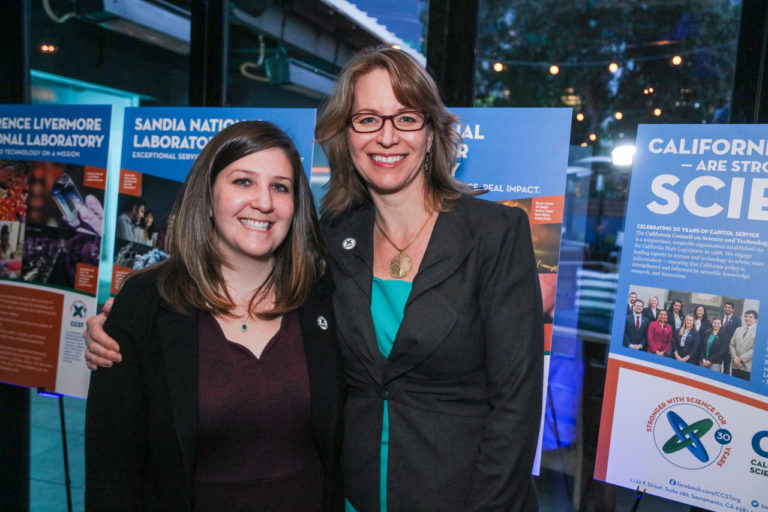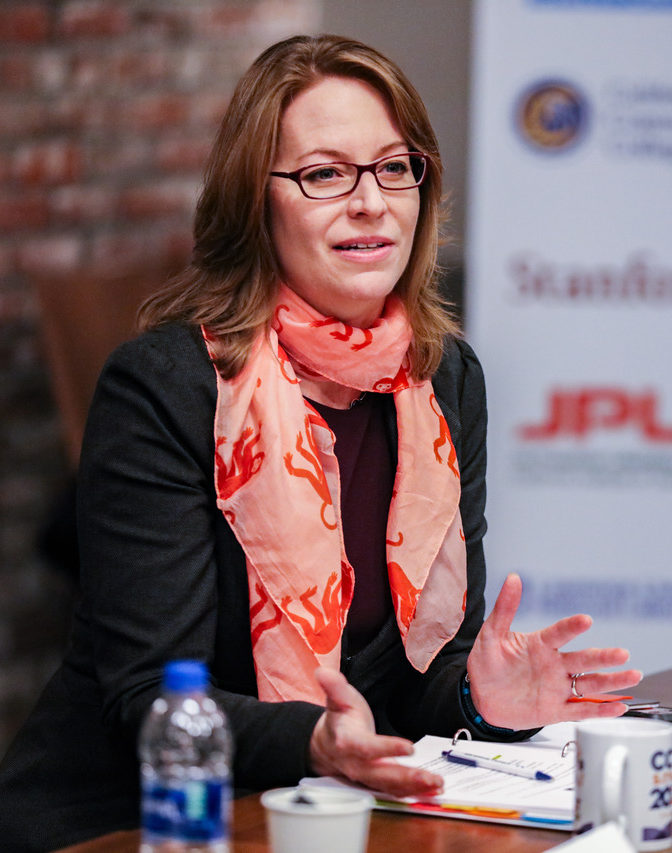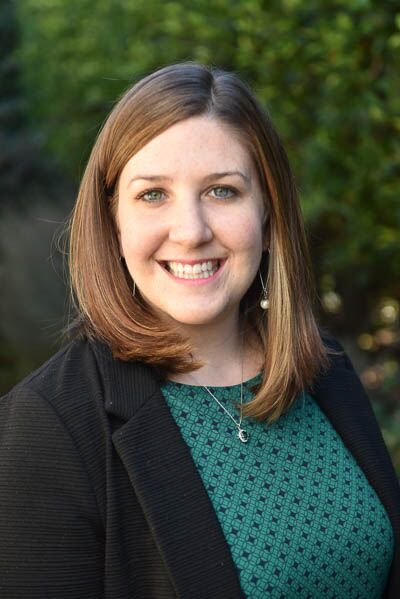
The California Council on Science and Technology (CCST) – a nonpartisan, nonprofit organization created by the Legislature in 1988 – connects California scientists to policy and decision makers with expert advice on issues ranging from wildfire and carbon emissions to education, public health, and disaster response. Since becoming CCST’s executive director in 2019, Amber Mace has led innovative programs designed to expand the contributions of California’s science and technology experts to evidence-based policy. Mace is a distinguished ecologist who, in 2006, was appointed by Governor Schwarzenegger to lead the California Ocean Protection Council and who has served as the executive director of California Ocean Science Trust. Sarah Brady completed a CCST Fellowship in 2014, during which she crafted legislation that required California colleges to establish a family leave policy for their graduate students, and led efforts related to biomethane and access to STEM education. As deputy director, Brady leads CCST’s outreach and directs projects commissioned by state agencies and the Legislature. Mace and Brady spoke with ESAL about the organization’s latest endeavors.

Amber Mace, CCST Executive Director
CK: What is the overall mission of CCST? What are its chief aims?
Mace: Our mission is to help make California’s policies stronger with science, and our aim is to make it easy for decision makers to access science and for our science community to engage in a way that helps advance California’s research enterprise and meaningfully informs policy. CCST is non-advocacy. It’s really about matching up the need for and the existence of science-based information that can help inform any kind of policy, and help California see what’s on the horizon. For example, whether it’s related to California meeting its carbon neutrality goals, whether it’s helping California prepare for, respond to, or recover from a disaster, or whether it’s an emerging issue that we haven't thought of. We want to make sure that decision makers know how to access information that can inform and compliment all of the other factors they have to consider.
CK: Can you say more about the new programs that you are building at CCST?
Mace: We have been piloting new ways to connect scientists and decision makers. We’ve been doing a lot of thinking with our partners at research and academic institutions about how to break down the barriers that inhibit science from being accessible and useful. At the same time, we continue to deliver peer-reviewed reports that are incredibly valuable because they are reliable, credible sources that decision makers – whether they're legislators or members of the governor's office or the executive branch – can look to for deep, detailed information on a particular issue. For example, what to do with underground natural gas storage in California, or what to do around investing in responses to wildfires. That's still core to our work. We also recognize that those types of documents take a long time to produce. They can be expensive and the decision makers operate on a very different timeframe. We are thinking about other ways of delivering information, knowledge, and advice that is more timely and relevant. We have been increasing the number of briefings that we've been delivering. While we always brief on a report that we deliver, we recognize how valuable it is to offer other briefings on topics that are emerging, or that have more time sensitivity. We care about getting the information in the hands of decision makers, and creating durable pathways for science to inform decision making. One way is to convene people who do not normally interact with each other through our briefings and workshops, which helps to foster relationships and idea exchanges.
CK: What are some success stories from the policy advisory work that CCST engages in and facilitates?
Mace: I would say the wildfire expert briefing, which was a four part series. It’s one of the series that led to decision makers asking our panelists to provide expert testimony. It also led to the creation of a report, which we're working on right now, to inform the state about the costs and losses associated with wildfires and helping the state prioritize limited resources around preparing for future wildfires, as well as wildfire response and recovery. There's so much more work that can be done there. A really important part of this success is creating conversations between the scientists themselves, in addition to ongoing conversations between scientists and decision makers who are actively working on wildfire response.

Sarah Brady, CCST Deputy Director
Brady: We’ve been developing ‘one pagers,’ in which we figure out how to identify and distill the really, really key parts of an issue. Everybody's busy and if you are a decision maker, and you just have one minute, it's hard to figure out what from a thousand-page report to look at. The effort has been a really big success, and we started doing it for our expert briefings and for our peer reviewed reports. For example, with the hydraulic fracturing report from a few years ago, it’s huge and has so much information that is still relevant today. We went back to it and wrote the one pager. So I think it's just continued to make our scientific network more accessible to decision makers, which is our mission.
CK: I'm wondering what’s in store for CCST’s policy advising in terms of ongoing and future issues, such as the COVID-19 pandemic. What can you tell me about CCST’s efforts in that area?
Brady: Responding to COVID-19 has presented an opportunity to continue to think through how we can best respond quickly when the state has immediate questions, and also how to think ahead about the questions decision makers can’t focus on immediately but they'll have to think about soon. For example, what lessons have we learned from our pandemic response so we can be more prepared for the next disaster? One of our strengths is identifying a great source of experts to come together, because California has such an incredible network of world-class academic and research institutions that we draw upon. Like our panels, we're covering different aspects of an issue so that we can help convene this conversation that may not have happened on such a broad level. One academic institution may be doing really, really amazing work, but they're not as familiar with the other amazing work happening at another institution in California. If we can pull that together, we strengthen what we provide decision makers.
Mace: A lot of attention at the state level is focused on the COVID-19 response right now, and as an organization we have been thinking about how we can be supportive and useful at a critical time like this. For real-time response, our best contribution to the decision making process is through our fellowship program. The scientists who are serving one-year fellowships through our CCST Science Fellows program are trusted members of the team in which they're placed, whether that's in the executive branch or the legislature. A lot of our fellows have been pulled in to working directly on COVID-19 in some way. We really want this to be driven by what the state needs and focused on what's happening in real time. We need to work with them on what the short-term, the mid-term, and the long-term look like.
CK: Can you tell me more about the Science Advisory Panel?
Mace: In fact, we’ve been thinking about designing the first iteration of the Science Advisory Panel as a working group focused on COVID-19. We are framing it more as a working group at this point because we felt the need to pivot and focus on this topic. At the same time, it is a perfect opportunity for us to frame out what the Science Advisory Panel would be doing. This is a great topic that can help inform our search for excellent contributors. We know that we need a diversity of expertise to address a topic that spans so many areas. This diversity of expertise will include social and behavioral scientists in a way that we haven’t been as explicit about in the past. We usually have economists as part of our conversation and as part of our team. But beyond that, we haven't had as much focus on other important social science expertise. One area that we want to consider is the role of cognitive bias. We must be aware of our cognitive biases if we're going to develop truly effective policy. There are plenty of behavioral scientists who are thinking about this who we're not currently bringing to the table. My hope is that by bringing these perspectives and expertise in, we can help to develop policy that's more robust and resilient to these cognitive biases from the start. Along with these efforts to include more social scientists, we’ll also be incorporating considerations of equity into the work we do, as part of our action plan to counter institutional racism. Part of this will most certainly include adding more experts on the Science Advisory Panel who can help us consider equity in all of the advice we provide. And beyond that, we feel we have a responsibility to apply a lens of equity to all of our programs and activities. Ultimately, we want to ensure that CCST can support and retain scientists and thinkers who reflect the communities we seek to serve. There’s a lot of work to be done and we’ve all been doing a lot of learning lately about ways we can improve. It’s something we are committed to over the long term.
For more information on how to get engaged, CCST recently released a Career Guide for Science Policy, developed by alumni of their Fellowship program.
Are you involved with an organization or effort that you think might be of interest to the ESAL community? Or have heard about an organization or initiative that you’d like to learn more about? Let us know here, and we may feature it in a future post.